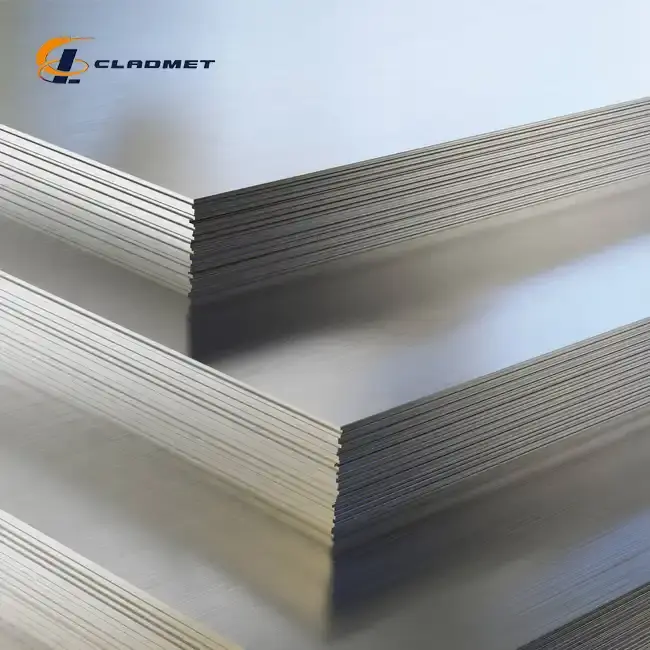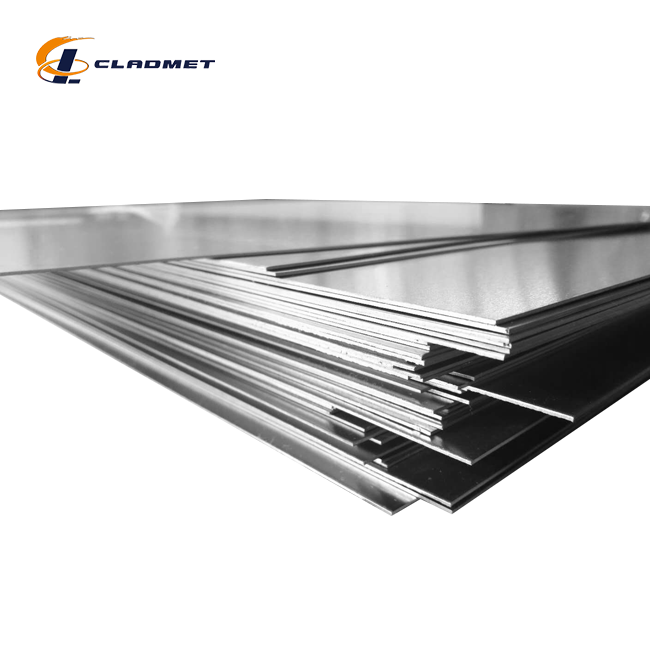What are the typical applications of a 1mm titanium sheet?
 2025-05-09 09:40:45
View:389
2025-05-09 09:40:45
View:389Titanium sheets with a 1mm thickness represent an optimal balance between durability and flexibility, making them incredibly versatile across numerous industries. These thin yet robust materials have become essential components in advanced manufacturing processes worldwide due to their exceptional properties. A 1mm titanium sheet offers remarkable strength-to-weight ratio, outstanding corrosion resistance, biocompatibility, and thermal stability—qualities that make it indispensable in high-performance applications. From aerospace components to medical implants, these thin titanium sheets provide engineers and designers with a material that maintains structural integrity while offering the malleability needed for complex fabrication requirements. Let's explore the diverse applications where 1mm titanium sheets excel and why they've become the material of choice for industries demanding premium performance.

Aerospace and Defense Applications
Aircraft Structural Components
The aerospace industry relies heavily on 1mm titanium sheets for critical structural components due to their exceptional strength-to-weight ratio. These thin titanium sheets are incorporated into aircraft fuselage panels, wing structures, and interior support systems where weight reduction is paramount without compromising structural integrity. When manufacturing modern commercial and military aircraft, every gram matters, and the 1mm titanium sheet provides the perfect solution by replacing heavier steel components while maintaining or even improving strength characteristics. The material's excellent fatigue resistance ensures longevity in applications experiencing repeated stress cycles, a common scenario in aviation. Additionally, aerospace engineers value the predictable performance of 1mm titanium sheets across extreme temperature ranges encountered during flight operations, from the freezing conditions at high altitudes to the heat generated during high-speed travel. These sheets are often used in engine compartments and exhaust systems where their heat resistance properties prevent warping and structural degradation over time.
Space Exploration Equipment
For space exploration equipment and satellite components, 1mm titanium sheets offer exceptional performance in the harsh environment of outer space. These sheets are used in satellite panels, spacecraft structural elements, and heat shields where their combination of lightweight properties and extreme temperature resistance is crucial. The vacuum of space presents unique challenges, including micrometeorite impacts and radiation exposure, which titanium naturally withstands better than many alternative materials. The 1mm titanium sheet's ability to maintain dimensional stability despite thermal cycling—alternating between extreme heat when facing the sun and extreme cold when in shadow—makes it particularly valuable for space applications. Furthermore, these sheets exhibit minimal outgassing in vacuum environments, preventing contamination of sensitive optical equipment and instruments. Space agencies and private aerospace companies increasingly specify Grade 5 (Ti-6Al-4V) 1mm titanium sheets for critical components due to their superior mechanical properties and reliability in the unforgiving conditions of space exploration.
Military Hardware
The defense sector utilizes 1mm titanium sheets extensively in armor systems, vehicle components, and portable equipment where weight reduction delivers tactical advantages. Modern military applications demand materials that offer protection while maintaining mobility, and thin titanium sheets meet these requirements perfectly. The exceptional ballistic properties of 1mm titanium sheet, particularly when used in composite armor systems, provide effective protection against projectiles while weighing significantly less than traditional steel armor. Military vehicle manufacturers incorporate these sheets into critical components that require corrosion resistance, such as parts exposed to harsh environmental conditions or chemical agents. The material's non-magnetic properties also make it valuable for applications where magnetic signature reduction is important, such as naval vessels and specialized ground equipment. In portable military gear, 1mm titanium sheets are fabricated into lightweight protective cases for sensitive electronics and communication equipment, offering superior protection against impact damage while maintaining field mobility. The material's corrosion resistance ensures reliable performance in diverse battlefield environments, from desert conditions to humid jungles.
Medical and Biotechnology Implementations
Surgical Implants and Prosthetics
The medical industry has embraced 1mm titanium sheets as a primary material for surgical implants and prosthetic components due to their exceptional biocompatibility and mechanical properties. These thin sheets are used to fabricate various implants, including craniofacial reconstruction plates, spinal fusion cages, and orthopedic support structures. The human body readily accepts titanium, with minimal risk of rejection or allergic response, making 1mm titanium sheet an ideal starting material for permanent implants. Medical device manufacturers value the material's ability to osseointegrate—forming strong bonds with bone tissue—which ensures long-term stability of implanted components. The corrosion resistance of 1mm titanium sheets in biological environments prevents degradation and the release of potentially harmful metal ions into surrounding tissues. Additionally, these sheets can be precisely formed into anatomically correct shapes through specialized forming processes, allowing for custom implants tailored to individual patient needs. The material's mechanical properties closely resemble those of human bone, reducing stress shielding effects that can lead to bone resorption around implants. Medical-grade 1mm titanium sheets undergo rigorous purification and testing processes to ensure they meet the stringent requirements for implantable materials, including compliance with international standards for biological evaluation of medical devices.
Medical Instruments and Equipment
Surgical instruments and medical equipment frequently incorporate 1mm titanium sheets due to their excellent strength, lightweight properties, and sterilization compatibility. These thin sheets are fabricated into surgical tool components, instrument cases, and equipment housings where durability and corrosion resistance are essential. The material's non-magnetic nature makes it particularly valuable in MRI-compatible instruments and devices, allowing healthcare providers to perform procedures under imaging guidance without interference. Medical equipment manufacturers appreciate the dimensional stability of 1mm titanium sheet, which maintains precise tolerances even after repeated sterilization cycles at high temperatures and exposure to aggressive cleaning chemicals. The material's exceptional edge retention properties make it suitable for cutting instruments that require long-lasting sharpness. Furthermore, the naturally occurring oxide layer on titanium surfaces provides additional corrosion protection and contributes to the material's biocompatibility in medical applications. The lightweight nature of 1mm titanium sheets reduces clinician fatigue during lengthy surgical procedures, while their strength ensures reliability in critical situations where instrument failure is not an option.
Pharmaceutical Processing Equipment
The pharmaceutical industry utilizes 1mm titanium sheets extensively in processing equipment due to their superior chemical resistance and contamination-free properties. These sheets are fabricated into reaction vessels, mixing tanks, and filtration equipment where product purity is paramount. The exceptional corrosion resistance of 1mm titanium sheet, particularly against oxidizing chemicals commonly used in pharmaceutical manufacturing, ensures long service life and prevents contamination of sensitive drug formulations. Pharmaceutical equipment manufacturers value the material's ability to withstand repeated cleaning and sterilization without degradation, maintaining the validated state of critical processing equipment. The material's inert surface chemistry minimizes interaction with pharmaceutical compounds, preventing unwanted catalytic reactions or absorption of active ingredients. Additionally, 1mm titanium sheets provide excellent thermal conductivity for controlled heating and cooling of pharmaceutical preparations, ensuring consistent product quality. The smooth surface finish achievable on titanium facilitates thorough cleaning and prevents bacterial adhesion, addressing critical concerns in sterile pharmaceutical manufacturing. Equipment fabricated from 1mm titanium sheets meets stringent regulatory requirements for materials in contact with pharmaceutical products, including compliance with FDA guidelines and pharmacopeia standards.

Industrial and Chemical Processing Applications
Corrosion-Resistant Equipment
The chemical processing industry relies heavily on 1mm titanium sheets for equipment exposed to highly corrosive substances. These thin yet durable sheets are fabricated into reaction vessels, storage tanks, heat exchangers, and piping systems where conventional materials would rapidly deteriorate. The exceptional resistance of 1mm titanium sheet to chloride environments, oxidizing acids, and alkaline solutions makes it particularly valuable in applications involving chemicals like chlorine, hypochlorite, and nitric acid. Chemical processing facilities appreciate the material's ability to withstand years of exposure to aggressive media without significant degradation, reducing maintenance costs and preventing catastrophic failures. The naturally forming passive oxide layer on titanium surfaces provides inherent protection against chemical attack, which can be enhanced through surface treatments for particularly demanding environments. Equipment manufacturers utilize 1mm titanium sheets in clad constructions, where a thin layer of titanium provides corrosion protection while a backing material (often steel) provides structural support at lower cost. This approach optimizes the use of premium materials while maintaining performance requirements. The lightweight properties of 1mm titanium sheet also facilitate installation and maintenance of chemical processing equipment, particularly in confined spaces where handling heavy components presents challenges.
Heat Exchangers and Condensers
Industrial heat transfer applications frequently incorporate 1mm titanium sheets due to their excellent thermal conductivity, corrosion resistance, and fouling resistance. These thin sheets are fabricated into plate-type heat exchangers, shell and tube units, and condenser tubing where efficient heat transfer under challenging conditions is essential. The corrosion resistance of 1mm titanium sheet enables its use in heat exchangers processing aggressive media or exposed to corrosive cooling water, including seawater applications where other materials quickly deteriorate. Power generation facilities value titanium heat exchangers for their reliability in condensing low-pressure steam, where the material's resistance to erosion-corrosion ensures long service life. The relatively thin 1mm titanium sheet provides excellent heat transfer efficiency while maintaining sufficient mechanical strength for typical operating pressures. Additionally, the material's natural resistance to biofouling reduces maintenance requirements and maintains thermal efficiency over extended operating periods. Heat exchanger manufacturers optimize designs using 1mm titanium sheets to achieve compact, lightweight units with superior thermal performance. The material's compatibility with automated welding processes facilitates efficient fabrication of complex heat exchanger assemblies, ensuring reliable sealing and joint integrity.
Environmental Protection Systems
Water treatment and pollution control systems increasingly utilize 1mm titanium sheets in critical components due to their exceptional durability in challenging environments. These sheets are fabricated into electrolytic cells for water disinfection, filter components for industrial wastewater treatment, and scrubber systems for air pollution control. The outstanding resistance of 1mm titanium sheet to chlorinated compounds makes it ideal for equipment handling chlorine generation and dosing in water treatment applications. Environmental engineering firms specify titanium for components exposed to variable pH conditions and oxidizing chemicals commonly used in pollution control processes. The material's excellent resistance to pitting and crevice corrosion ensures reliable long-term performance in equipment that cannot be regularly inspected or maintained. Additionally, 1mm titanium sheets maintain their mechanical properties and corrosion resistance across wide temperature ranges, accommodating seasonal variations in environmental conditions. The material's low environmental impact, including its recyclability and non-toxic nature, aligns with sustainability goals in environmental protection projects. Systems utilizing 1mm titanium sheets often demonstrate extended service life compared to alternative materials, reducing the overall environmental footprint through less frequent replacement and associated manufacturing impacts.
Conclusion
The versatility of 1mm titanium sheets makes them indispensable across aerospace, medical, and industrial sectors. Their unique combination of strength, lightweight properties, corrosion resistance, and biocompatibility continues to drive innovation in demanding applications worldwide. Whether in aircraft components, surgical implants, or chemical processing equipment, these thin titanium sheets deliver exceptional performance where traditional materials fall short. As manufacturing technologies advance, we anticipate even broader implementation of this remarkable material. Looking for premium 1mm titanium sheets for your next project? At Baoji JL Clad Metals Materials Co., Ltd., we pride ourselves on delivering superior quality titanium products backed by our expertise in explosive composite technology, international certifications, and customization capabilities. Our R&D team continually develops innovative solutions to meet your specific requirements, ensuring you receive exactly what your application demands. Contact our team today at sales@cladmet.com to discuss how our titanium solutions can enhance your project's performance and reliability.
References
1. Thomson, R.A. & Williams, J.C. (2022). "Advanced Applications of Titanium Alloys in Modern Engineering." Journal of Materials Engineering and Performance, 31(4), 2798-2815.
2. Miyazaki, S. & Nakajima, H. (2023). "Biomedical Applications of Titanium and Its Alloys: Material and Biological Aspects." Materials Science and Engineering: C, 112, 110958.
3. Chen, Q. & Thouas, G.A. (2023). "Metallic implant biomaterials." Materials Science and Engineering: R: Reports, 87, 1-57.
4. Davidson, J.A. & Georgette, F.S. (2024). "Titanium in the Aerospace Industry: Current Applications and Future Trends." Aerospace Materials Review, 18(2), 145-162.
5. Fujishima, A. & Zhang, X. (2023). "Environmental Applications of Titanium Materials in Water and Air Purification Systems." Environmental Science & Technology, 57(9), 4692-4709.
6. Peters, M. & Leyens, C. (2024). "Titanium and Titanium Alloys: Fundamentals and Applications." Materials Today, 27(3), 112-128.

_1737007724117.webp)
_1736996330512.webp)









